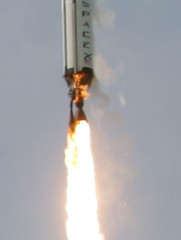New Falcon 1 Rocket Destroyed on Maiden Voyage
An engine fire destroyed Space-X’s Falcon 1 rocket on its maiden voyage today, according to reports.
 The International Reporter has early details:
The International Reporter has early details:
The US vehicle, developed by the Space Exploration Technologies Corp, was destroyed soon after take-off from the Marshall Islands in the Pacific Ocean. The vision of Elon Musk, co-founder of the electronic payment system PayPal, the Falcon was designed to cut the cost of current satellite launches.
An onboard camera appeared to show the rocket rolling out of control shortly before the video signal was lost….
The rocket was attempting to carry a 19.5kg satellite to a low-Earth orbit of 450km. The satellite, FalconSat-2, was built by US Air Force Academy cadets to investigate the phenomenon known as "space weather".
Elon Musk has additional details on the Space-X blog:
The good news is that all vehicle systems, including the main engine, thrust vector control, structures, avionics, software, guidance algorithm, etc. were picture perfect. Falcon’s trajectory was within 0.2 degrees of nominal during powered flight.
However, at T+25s, a fuel leak of currently unknown origin caused a fire around the top of the main engine that cut into the first stage helium pneumatic system. On high resolution imagery, the fire is clearly visible within seconds after liftoff. Once the pneumatic pressure decayed below a critical value, the spring return safety function of the pre-valves forced them closed, shutting down the main engine at T+29s.
It does not appear as though the first stage insulation played a negative role, nor are any other vehicle anomalies apparent from either the telemetry or imaging. Falcon was executing perfectly on all fronts until fire impaired the first stage pneumatic system.
Our plan at this point is to analyze data and debris to be certain that the above preliminary analysis is correct and then isolate and address all possible causes for the fuel leak. In addition, we will do another ground up systems review of the entire vehicle to flush out any other potential issues.